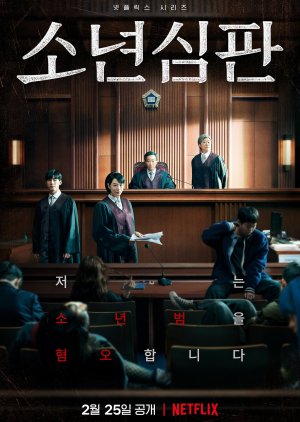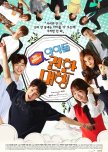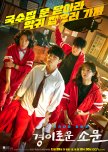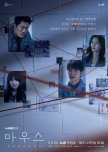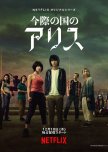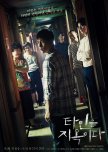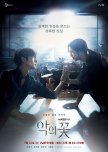
Was this review helpful to you?

This review may contain spoilers
To what extent is a child, still a child?
Juvenile Justice lingers somewhere in between social commentary and courtroom drama, as the latest instalment of Netflix’s additions to the dark genre of Korean Drama. The show follows Shim Eun Sok, a judge with a hidden past and intense dislike (or self described hatred) of young offenders. This is because often under Korean Juvenile Law, there are lesser sentences and repercussions for juveniles due to diminished responsibility.Firstly, the main lead. She definitely did her job as a sort of anti-hero. She isn’t exactly kind or easy to categorise or ‘nice’ in the traditional sense of the word but evokes emotion and thought, which I’m certain the show runners wanted for many of these scenes. Also, as the cases go by and more is revealed about her it’s like they build a portfolio of her life, as a result of the children, the excuses that are often made for them and the damage left behind by their crimes. Her acting was superb and I think they really highlighted that they don’t care if you like her or not, she’s been through it and she’s allowed to feel everything that comes with it. Often the term ‘anti-hero’ is used in Kdramas for those who are borderline villains but serve as protagonists in a way to separate them from the antagonists they oppose. However here is one of the best depictions of a nuanced and well executed character.
As for the rest of the cast, due to the anthology like structure in which a case may cover 2-3 episodes before it’s conclusion, across the board there is some amazing performances, particularly by the mother of the elementary school boy and the Chief, who is torn between his family and justice.
The plot really asks this focal question: up until when is a child STILL a child, and when can the innocence and lack of experience at life, pardon graphic violence and abuse. The reduction of children to naive and innocent all the time doesn’t explain why the victims are never afforded the same luxury; to be seen as an innocent child who was at the mercy of an abuser, murderer or system that refuses to recognise them. It’s does not just singled out to Korea but is 100% a call for the rest of the world to re-asses crime in youths.
I also love how, typically, with this genre of gritty Korean TV, often juvenile time and violence is centred around bullying but, using real life cases, they explore crimes that affect all of society like class inequality and it’s manifestation in youth, as well as a failure to protect children with harsh upbringings and backgrounds from a life of crime to survive.
The only negative which I believe is echoed by many watchers is the desperation by the writers to force action, which causes a judge to turn into a police officer/detective/lawyer herself. I think I’m an effort to get action that wasn’t so heavy, such as the car journey involving students or murder of a child, they wanted her to be out and about, doing something. Furthermore, multiple roles could be given to her to shed the perception some may have of the show as boring or mundane. With little high speed chases, romantic cliches and major plot twists, the show is definitely geared to a more mature or legally inclined audience, who don’t mind the lack there of.
The only reason I have given this a low rewatch value despite my own high rankings, the emotion and turbulence of the show has a permanence that is drilled in by the end of the season. Rewatches are possible but the effect and message of the show are slightly less dramatic the second time round.
?? ????? ??????????????:
Juvenile Justice is for you if you’re looking for a strong female anti-hero, and prefer darker television. Slightly out of character at some points, the main lead makes up for in gut wrenching scenes that are both eloquent and poignant. A rewatch is unlikely but not impossible, yet what is the most importance is the dilemma it presents the audience with - for how long is it possible to ignore criminality in children, and better yet, how much longer can we pretend there is no problem?
Was this review helpful to you?

This review may contain spoilers
It takes a village to raise a child
This drama comes at you swinging and knocks you off for good with the last episode.Writing, directing and acting are all superb (and, surprisingly, I found the OST just as outstanding) but I dare say this is not an easy, leisurely watch.
Although the pacing is sustained and the storytelling extremely fluid and engaging (I personally binge watched it in 2 days), the topic is a heavy one. The writer aims at informing a discussion on juvenile justice reform and successfully conveys its complexity while reminding us of its wide impact on society as a whole, not only on the minors directly involved.
We are guided through the main discourse whilst following mainly 3 groups of characters: judges, young perpetrators and victims. The lines among these 3 groups become voluntarily blurred (at one point Judge Sim tells us that anyone can become a victim. Later on, in the episode on judge Kang and his son, we learn that the same is true for perpetrators) and, as we discover each backstory, it is impossible to remain indifferent to the grief onscreen. Nonetheless, it never feels forced or minutely crafted to obtain an easy emotivity.
This was my first encounter with Kim Hye-soo, surprisingly so given her fame and talent, and she instantly became a favorite. Her character is introduced to the audience almost as an antagonist - shrouded in monolithic severity and inflexibility - compared to the warm and sympathetic Cha Tae-joo, who protects and guides the youngsters as their big brother hero.
However, as the story unfolds, we come to respect and appreciate severity as the necessary quality to mete out justice.
A special gravitas, the most inflexible and unwavering constitution is required in seeking the truth in order to uncover guilt and reach the ultimate powerful tool of catharsis: punishment.
Shim Eun-seok transcends her private identity and tragedy to become the personification of a justice that can heal both the victims and the perpetrators.
As doctors save the body, Judges save the ethics that sustains civil society.
And this mission is even more crucial if it involves young offenders at a point in their life when their ethics, their morality, is still indefinite and unshaped.
Kim Hye-soo manages, with her Junoesque physicality, to incarnate the divine quality of justice and shape it as a quintessential mother figure.
Also, she totally feels like a formidable dominatrix (with her high heels and strict suits and natural commanding tone. Tae-joo feels like her devote sub, instead).
Take home message: It really does take a village to raise a child.
Female Empowerment Score 5/5: women are truly the backbone of society
Was this review helpful to you?

curious!!!!
This review is about dramas related to detectives, bullying cases, murders. heheh... don't want to move to another genre yet. because I really don't want to . This Korean drama tells the story of a judge who focuses on juvenile court. There are various types of child cases that really make you nervous. in eps. 1 has even aired a murder case. committed by a child under the age of . in another story, there are also cases of child prostitution, cases of rehab houses that were suspected of having problems but turned out to be opening up other cases. really mind blowing guys... . So on average, why do these children become so stubborn, naughty and behave miraculously, usually starting with their parents. who are busy, who do not have time and even willing to abandon their children. This drama is really complete. there are funny, touched, sad to shock. With only 10 episodes, I don't get bored watching it. know it's over. love itWas this review helpful to you?
Interesting legal drama
There are times I would veer away from my typical drama list and watch something serious. For me, Juvenile Justice didn't disappoint.With just 10 episodes, the drama was able to show several examples of delinquency among youngsters. It is a difficult thing, handling juvenile cases. It could make or break a minor's future. I liked how the writer was able to spin different cases to highlight how the judges' decision are made.
The FL's facial expression were kind of bland but as the drama progressed, you will get an insight on how she came to be the aloof, aggressive judge...
Personally, I would not mind another season of this legal drama
Was this review helpful to you?

This review may contain spoilers
Who Will Save The Children?
There is a universal disease that runs rampant throughout the world. It really doesn’t matter the country or culture. It’s there. And it’s something that has become indelibly worse over the years. The disease is indifference. And we see first-hand in this series how much indifference has seeped into the children of society. Children are no better than adults when it comes to preying upon those they deem weak and worthless. Physical and cyberbullying are only the symptoms of a much bigger problem. They are symptoms of indifference.The series could almost be called, “The Tragedy of Judge Shim.” She is a cold but effective judge who confesses that she despises young offenders. The reason for this hatred stems from a past experience that we don’t learn about until the series' last two episodes. It is not accurate to state that she doesn’t care. She does. And she is just as eager to investigate a case and uncover the truth as she pronounces sentences that she feels are the most effective and the most just when dealing with juvenile offenders. Unfortunately, Judge Shim lives in a prison of her own making. She lives in a barren apartment that has no warmth or meaning to it. Her sole purpose is to preside over juvenile offenders. In many ways, she’s allowed those who killed her son to kill her as well. For what kind of a life is that? In the end, the perpetrators may have finally been brought to justice, but she’s allowed them to destroy her too.
Judge Shim is an effective judge even though she can be quite foolish. Chasing a young offender through the streets to try and apprehend her alone wasn’t a smart thing to do. Also, breaking into the hideout of a known, violent offender was beyond foolish. It nearly got her killed in the process. But I suppose that someone who’s essentially already dead inside, probably doesn’t care too much about what happens to them. Indifference isn’t only about how we treat others. It's also about how we treat ourselves.
If the numbers that are put on display at the very beginning of the series are accurate—3,300 judges in Korea with only 20 juvenile judges—we can see why the youth of Korea are in such dire straits and why the juvenile courts certainly need more help and resources.
Each case spans about two episodes, and neither the writer nor the director holds back when it comes to depicting youth crimes. They are raw, violent, and meant to demonstrate the sheer cruelty that is perpetrated upon those who are preyed upon. It shouldn’t matter that these are children and not adults. We quickly find that it doesn’t matter the age or the circumstances. Children are just as capable of any type of violent crime as their adult counterparts.
One of the reasons I love K-dramas so much is that most of them carry a much-needed message. A show like this isn’t just for entertainment purposes but is trying to shed some light on a much-needed issue that must be addressed. Many victims and victims’ parents ask the same question: “How can someone so young do something like this?” We live in a world we think is safe. We live in a world that should be safe, especially for the children. But, sadly, it is not so.
If you don’t address the core problem, then nothing will change. Things will not only stay the same, but they are likely to get even worse. There is a common denominator among many young perpetrators. They come from broken homes. They tend to come from poor families. They tend to be bullied children and outcasts themselves. Some have mental disorders. And ironically, these are also the commonalities found among adult criminals as well.
Punishment is pointless without rehabilitation. Judge Kang is correct in his assessment that harsher punishments don’t work. Rehabilitation is required. And as Judge Shim points out to Judge Cha, it does, indeed, take a village to raise a child. People are like points on a spider web. Remove one point, and the entire web begins to come apart. And it takes teachers, friends, family, shopkeepers…everyone! Raising a child is NOT about telling them what to do and what not to do. It’s about empowering and educating them so that they can make wise decisions. But none of that matters unless indifference is removed from the equation. Compassion is a key component, for if people truly care for each other, they will always look out for one another.
One of the saddest things I saw in this series is the ostracizing of the victims. My God! This is proof of the indifference that I’ve talked about. How can you simply cut off a person for something that happened to them? And blame them? That is truly sickening, and those who do these things are no better than the criminals themselves. Indeed, they are the same.
Performances across the board were astounding and powerful. Kim Hye Soo gives us Judge Shim who is strong on the outside but broken on the inside. I saw Lee Sung Min in Misaeng—a series in which he was nothing short of brilliant—and I was thrilled to see him in this series as a judge who’s lost his way.
This isn’t necessarily an easy series to watch, but it’s a necessary one. If people don’t start to wake up and realize that changes are needed in how we deal with each other, let alone our children, then it really will be impossible to save the children, let alone anyone else.
Was this review helpful to you?

A very powerful drama
Which was a bomb went it was released in Korea as it highlights the issues about juvenile delinquency but which in fact, resonates with every country.Compared to similar dramas very engaged and committed that say something outloud and speaking up about crucial problems…here it is very much “romanized”, a tiny bit far from reality but not less appreciatable because it’s very well done.
What I enjoy the most personally are the side
stories. To which you can relate. The main character’s development is beautiful and interesting. Certainly her best role, both in her performance and complexity.
We also have a drama for which the end is very well made, which is usually lacking in the korean drama industry.
Was this review helpful to you?
Not For Everyone
This isn't a series for those looking for a thriller or fictional suspense story. It's a series that is a laying out of reality with no twists and turns meant to entertain the audience. It follows the simple format of a broken legal system and a judge who does her best to both implement the law while getting to the bottom of the truth with each case. It personally resonates for me and may not for everyone.For some reviewers who question the "dramatization" of the cases, I can only assume they've grown up in relatively safe and comfortable homes with others to rely on (who they usually take for granted). Because those who get it, get it. And those who don't, usually never will. After all, being spoiled has nothing to do with finances but rather those in their lives who've emotionally spoiled them. The actuality is that these cases are still pretty watered down in comparison to real life situations, but still vivid enough to make its point.
What I additionally appreciate about the series is the emphasis on how even those with the best of intentions, end up being hypocrites when it comes to something hitting their own "home". And while those sitting comfortable behind their computers with little or no responsibilities will shout their criticisms, it's a very real and human dilemma that occurs in everyone's day-to-days. It's easier to judge others' choices when it makes no impact to their own personal lives, and easier to self-justify when it comes to their crossroads of sacrifices.
There's no glaring negative other than the pacing of stories and its developments (certain scenes that weren't as believable when it came to how the judge found evidence). There were also some moments that felt a little too prolonged and other moments that felt too abbreviated. But overall, if what I've discussed above also resonates with you and you're fine with a somber environment, you'll enjoy this series.
Was this review helpful to you?

Firstly, the cinematography is just top notch, they set the right lighting, mood, and music to certain scenes that needs extra focus, and scenes that needs more emotions. The actors and actresses did a great job portraying their characters, especially the leads. Then again, they are the respected actors in Korean entertainment industry, no wonder they did an excellent job portraying the characters. The teenage actors who played juvenile also did an excellent job, especially the child killer. I was surprised to find the cast of the boy is actually a mid twenties actress.
The plot of this drama is also well written, not draggy and not too straight forward either, which makes a perfect thriller drama. Totally would recommend people to watch this!
Was this review helpful to you?
This review may contain spoilers
I wish they showed me more
The idea at the base of this drama is very interesting. I often see shows that tell the stories of police officers, lawyers, prosecutors, or even judges who deal with all sorts of crimes, but in these shows I rarely happen to see younger criminals. I'm not sure of how much realism is in this drama in particular, but it seems to offer a very good glimpse of what does juvenile justice imply for everyone involved: from the perpetrators, to the victims, to the judges themselves. Some of the cases that were shown in this drama were stronger than others, but they were all very interesting to watch.What I believe was actually lacking, and also ended up lowering my rating for the series, is the overarching plot that involves Judge Sim, Judge Cha, and all the other recurring characters.
At the beginning of the story we see the protagonist, Judge Sim, as a very strict and closed off individual, who is completely focused on her job and leaves little to no room for anything else, and also "detests young offenders" with a passion. On the other hand we're also introduced to Judge Cha, who is a much warmer judge and shows empathy and understanding toward the kids he's in charge of, and seems to believe in giving them a second chance to live a "good" life.
I might have had wrong expectations from the get-go, but I thought that the show would give equal importance to both judges and their mindsets, even at the cost of putting them at opposite sides of an argument more often than not. What I actually ended up seeing, instead, was Judge Sim having such a strong and indomitable personality that Judge Cha had no other choice than to shrink in her presence all the time, only raising very weak objections to her thoughts before becoming quiet for the rest of the case. Rather than a duo with a good dynamic, it felt more like Judge Cha became nothing but a tool for Judge Sim to use as she needed. Neither changes in any significant way in the end.
Even their backstories didn't seem as important as I thought they would be. Judge Cha's past is brought up and explained all at once, and stays completely irrelevant for the sake of the plot for the rest of the show. As for Judge Sim, while her past does explain her passion toward condemning young offenders, it doesn't do much to add depth and nuance to her situation (and I'm still wondering why was there the need to show her ex husband at all, other than providing another obstacle through her ex mother-in-law).
The rest of the cast as well (Judge Kang, Judge Na, and everyone else) seemed very underutilised in my opinion.
If you're only interested in the specific cases shown in the drama, it can be a very fun watch (I know I had fun while watching them!), but I can't recommend it if you're looking for an interesting plot and well made characters.
Was this review helpful to you?

Was this review helpful to you?

It's a shame they canceled the second season
The series moved me a lot, I was extremely emotional with the judges' story (especially in the last episode where Shim was going to visit the cemetery, that made me cry a lot). I really wanted there to be a second season, when I researched it I was sad to find out that they canceled it. These juvenile laws are absurd, they deserved to be punished more rigorously. I was angry with Judge Na, she judged the murder case of Judge Shim's son very badly, there was no justice and there were no teachings for the two murderers. The series really captivated me, I loved how Judge Shim helped those who needed it and punished those who needed it, she is incredible and perfect, I loved her so much. Judge Cha was also impeccable, I confess that I fell in love with him, I was thrilled that he found the judge who helped him as a child, and Judge Kang, he was incredible, impeccable, I was sad that he didn't enter politics, I'm sure he would have done several incredible things. The ending seemed a little confusing, too rushed, it could have had 16 episodes, I would have loved it and been interested in other new stories.A fact that I was already forgetting: guys, how hateful is that mother of Shim's ex-husband's, what a miserable old woman, how could she have done that and gotten away with it? And that ex-husband of hers? What an imbecile man, "that's how the law is" "he was also my son", how did he accept it so easily? How could he have gone after Shim just to interfere in her life? Having gone after her to tell her not to get involved in in the case of those damn murderers?! And still letting his mother know and letting her do that stupid thing in court, in front of everyone. If I were Shim I would have punched him when he showed up at her door.
Was this review helpful to you?

